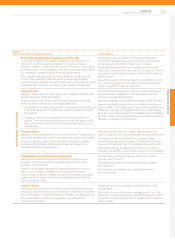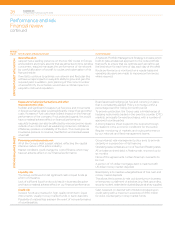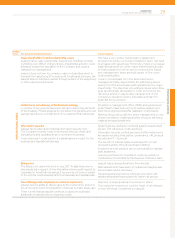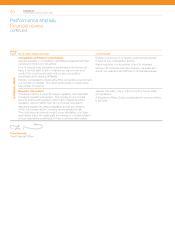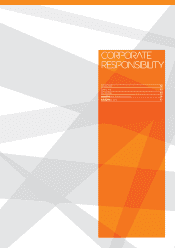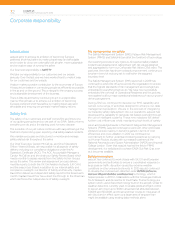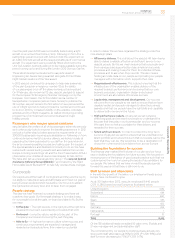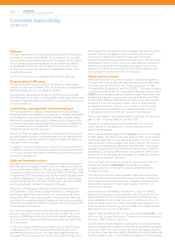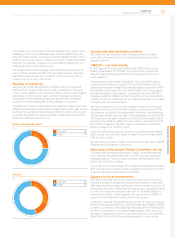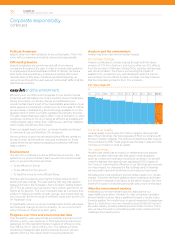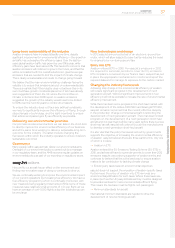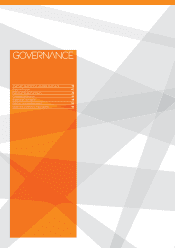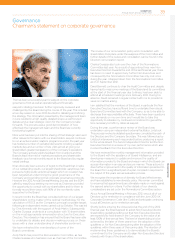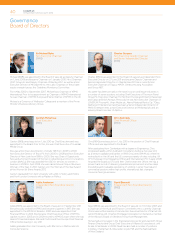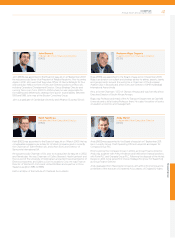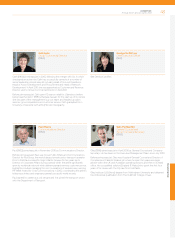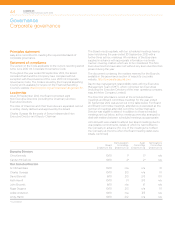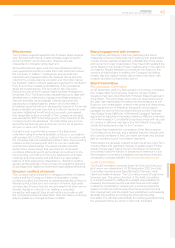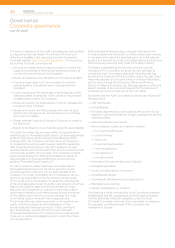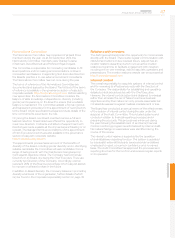EasyJet 2012 Annual Report Download - page 39
Download and view the complete annual report
Please find page 39 of the 2012 EasyJet annual report below. You can navigate through the pages in the report by either clicking on the pages listed below, or by using the keyword search tool below to find specific information within the annual report.
Long-term sustainability of the industry
Aviation emissions have increased steadily over time, despite
significant improvement in environmental efficiency – the growth in
air traffic has outweighed the efficiency gains. Over the last ten
years global aviation traffic has grown by over 5% a year, while
efficiency gains have been about 2%. This has led to concerns that
aviation emissions will continue to grow in the future, and that this
will be inconsistent with the overall reductions in greenhouse gas
emissions that are needed to limit the impact of climate change.
This is clearly unsustainable and needs to change going forward.
We believe that the main environmental key challenge facing the
industry is to ensure that emissions are put on a downwards path.
There is a real risk that if the industry does not achieve this on its
own, it will have growth constraints placed on it. We have already
seen suggestions of this in the UK, where the Committee on
Climate, in its December 2009 report on aviation emissions,
suggested the growth of the industry would need to be limited
to60% over the next 40 years to control UK emissions.
To ensure the industry does not face any artificial constraints
weneed to significantly improve the efficiency of flying, through
step-changes in technology, and the right incentives to ensure
thatairlines and passengers fly as efficiently as possible.
Delivering our environmental promises
Our promises revolve around actions we can take in the short-term
to directly improve the environmental efficiency of our business,
andat the same time working to deliver a sustainable long-term
outcome for the industry. The latter involves changing the
framework within which the industry operates to ensure it delivers
sustainable outcomes.
Governance
Many people within easyJet help deliver our environmental aims.
Oversight of our environment policy is carried out by a manager
inour regulatory team, and the AMB receives regular updates on
environmental policy as part of our reporting on regulatory issues.
easyJet actions
How we fly our aircraft has an effect on the environment and
finding new innovative ways of doing so continues to drive us.
We are continually working to improve the environmental impact
of our current operations by increasing fuel efficiency. We have a
fuel efficiency programme which is continually monitored, with
new measures being regularly implemented. While some of these
measures save relatively small amounts of CO2 per flight, as we
have an average of over 1,000 flights a day the total savings can
be very large.
New technologies and design
In 2012 easyJet announced a trial of an electronic ground taxi
motor, which will allow easyJet to save fuel by reducing the need
for engines to be run during ground taxi.
Entry into ETS
Aviation entered ETS in 2010. For easyJet’s emissions in 2012
itisrequired to surrender permits to cover its CO2 emissions.
ETScompliance is overseen by our finance team. easyJet has put
inplace the appropriate mechanisms to monitor and report the
required data and to manage its exposure to the carbon market.
Changing the industry framework
Achieving step change in the environmental efficiency of aviation
will require significant progress in the development of next-
generation aircraft. Without significant improvements in fuel
efficiency it will not be possible to increase the rate of environmental
efficiency improvement.
While there has been some progress in the short-haul market, with
the development of the Airbus A320 NEO and Boeing B737 MAX,
easyJet remains concerned that the current effective duopoly
intheproduction of large commercial aircraft is restricting the
development of next-generation aircraft. There has been limited
progress on the development of a next-generation short-haul
aircraft and it is clear that it will be many years before there is a new
short-haul aircraft. easyJet will continue to push the manufacturers
to develop a next-generation short-haul aircraft.
It is also vital that the policy framework set out by governments
supports the objective of increasing the environmental efficiency
ofaviation. easyJet believes there are three parts to this, only one
ofwhich is in place.
A Aviation in ETS
Aviation entered the EU Emissions Trading Scheme (EU ETS) in
2010, and airlines will have to surrender permits to cover their 2012
emissions. easyJet was a strong supporter of aviation’s entry and
continues to believe that this is the best way to ensure aviation
makes its fair contribution to tackling climate change.
A Ensuring any taxes support environmental objectives
easyJet does not support the imposition of aviation specific taxes.
Furthermore the entry of aviation into ETS removes any
environmental justification for such taxes. Where these taxes are
inplace (such as the UK) easyJet believes they must be designed
toprovide incentives for more environmentally efficient flying.
Thismeans the tax base must be flights, not passengers.
A Minimum standards for aircraft
International minimum standards are needed to drive the
development of new technology aircraft.
Corporate responsibility
easyJet plc
Annual report and accounts 2012 37


